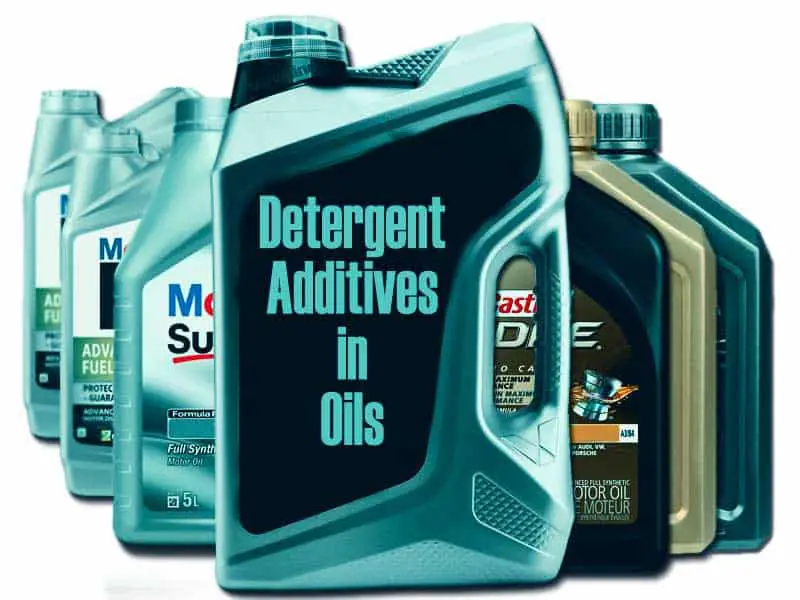These are ingredients of any engine oil as they help the engines by cleaning up the sludge and other deposits (which hinders parts functioning).
Calcium, magnesium, sodium, barium, and other alkaline earth metal-based compounds are used for making these detergents. And to enhance the efficiency of these detergents, further, some dispersants (long-chain hydrocarbons) are being integrated with them.

The fundamental function of these compounds is to suspend the deposit particles that could later be removed during oil interchange, they also counterbalance the acids that develope during oil ignition.
They are used in several applications like cars, trucks, marine-related equipment, equipment used for off-roading, and many more.
Table of Contents
Detergents & their Working:
So, their first job here is to clean the metal components of the engine in order to make them free of any kind of deposits.
For example, they are used to clean the contaminants of the carburetor that could otherwise hamper its functioning.
Moreover, they are also found to be extremely effective in reducing the deposits of fuel injectors so the pattern of fuel spray does not get affected.
In addition to cleanliness, they are also used to counterbalance the acids that develop during the combustion of oil (as they have alkaline nature).
In this way, they are used for both cleanliness as well as to inhibit corrosion of the engine parts.
As the oxidation of the oil begins, the acids start to build up. Due to continuous acid formations, the Total Acid Number (TAN) of the oil starts to increase. Alkaline detergents are used to lower this TAN value. Therefore, the concentrations of these basic detergents decrease over time so it is essential to regularly note the TBN (Total Base Number) of the oil in order to ensure smooth engine working.
On the other side, during high-temperature situations, ash build-up occurs due to the burning of metallic compounds. To make oil free from the ash, detergent additives are made part of it in addition to dispersants. Thus, detergents and dispersants work together to rinse the engine from the ash residue.
FYI: Previously, most detergents are barium-based however modern-day motor lubricants used detergents that are formulated from different compounds. Nowadays, most detergents are formulated from calcium and magnesium which prove to be more productive.
about Dispersants
Dispersants are the “other extra supplements” that are included in the oil for rinsing the oil contaminants.
They simply mix up the unwanted particles together and they get removed in the next oil change.
These unwanted suspended particles (having sizes of less than 1 micron) lowers the car efficient and could cause engine wear and tear (in long term use).
These dispersants are generally organic in nature and do not form ash upon burning. Their structure have molecules which are spiral-like. They consists of a polar head and a tail that is oil soluble (oleophilic).
Or in simple words they are large chained hydrocarbons. and these compounds are usually not detectable from traditional oil analysis.
Uses of Detergent and Non-Detergent oils
The usage of detergent or non-detergent oil for the equipment is normally specified by the OEM (Original Equipment Manufacturer).
If the application is required to counter situations involving frequent water interactions or deposits, the oil with excessive detergents is more beneficial.
Some prime applications where these oils are used include trucks, cars, aquatic equipment, off-road equipment, and more.
All these applications require the acids to get neutralized for cleaning of pumps as well as valves to ensure their smooth running.
On the other hand, there are some types of equipment that require detergent-free oil.
Since a majority of the oils these days are developed with an excessive number of detergents, these oils with no detergents are produced only by some specific manufacturers.
These oils are used as lubricants for bearings and chains. In addition, they are also used for appliances that are powered by gas such as lawnmowers and some tractors.
Generally, these oils are not recommended to be used in place of normal engine oils.
Detergents used in Today’s oil
Detergents play a very vital role to help combat the high TANs along with cleaning of sludge deposits.
Nowadays, manufacturers make detergents as well as dispersants a necessary part of the engine oils.
Although there are some non-detergent oils still available in the market, they have limited applications and are usually not recommended by most OEMs.
So, it is essential to find the detergency of the oil before buying it as the oil having higher detergents helps to clean the engine thoroughly, protect its components from corrosion, and maximize engine life and performance.
Summing up:
All in all, the detergents along with dispersants prove to be extremely vital for any engine oils.
The oil exhibiting these compounds in abundant amounts will result in better overall working.
Their greater amounts will provide more longevity.
With the current development in detergents and dispersants technologies, the oil having these compounds in abundance should be preferred to prolong engine life.